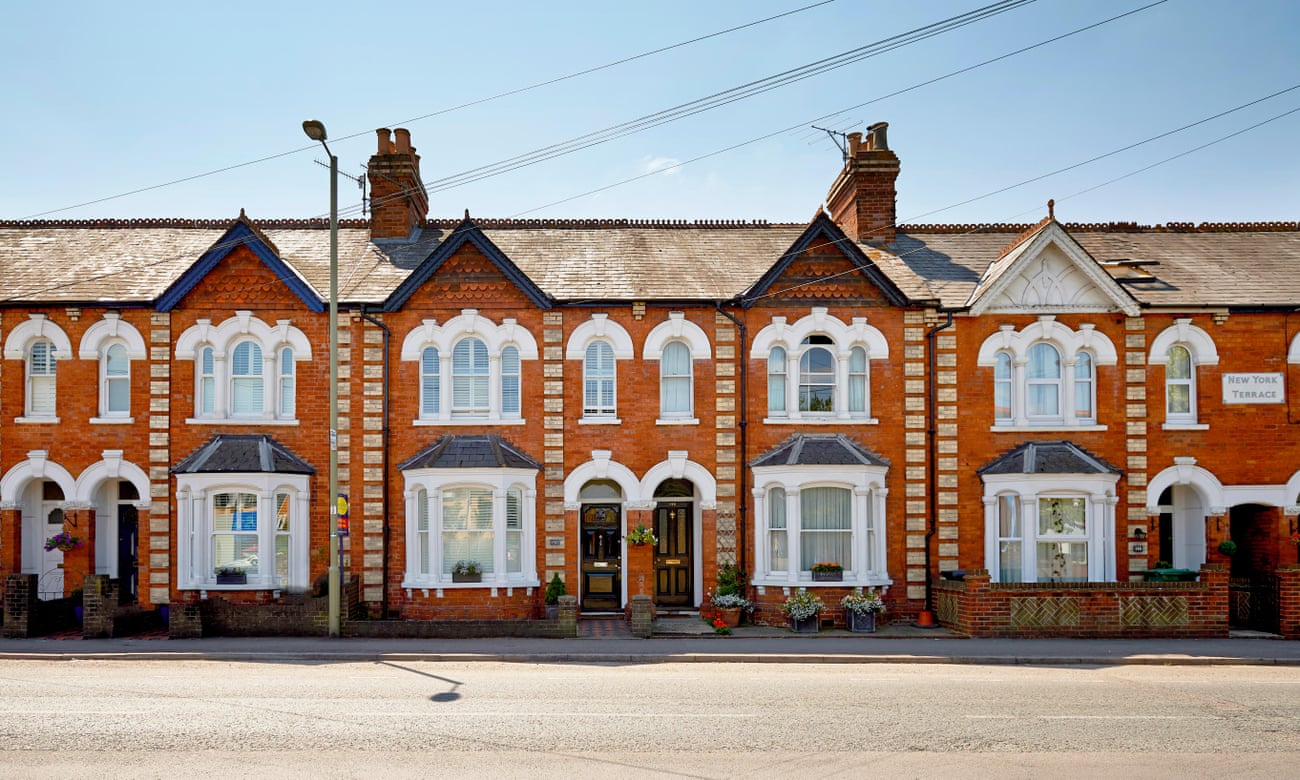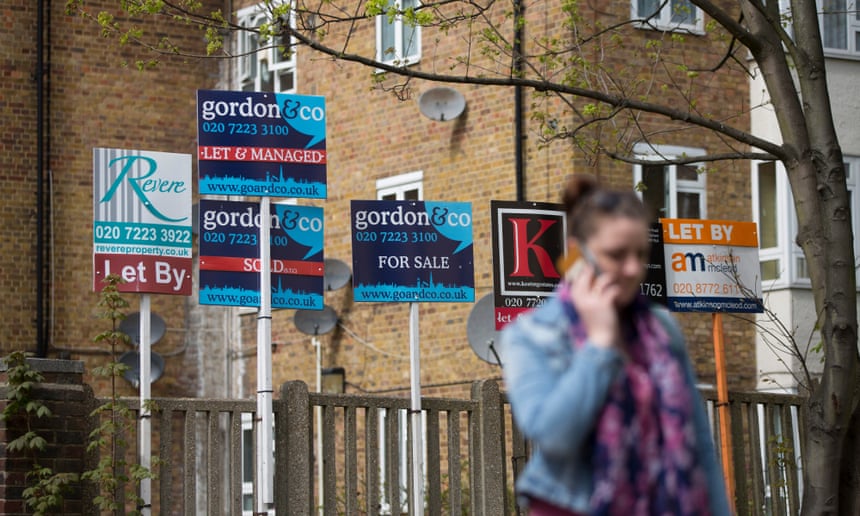Britain’s housing market has hit the buffers as political uncertainty, stamp duty changes and squeezed household incomes all dampen buyer demand.
Over the past week, Britain’s biggest mortgage lender, Halifax, said that annual house price growth had slowed to the weakest rate in four years and the official surveyors’ body said that activity was back to 2011 levels in some parts of the UK.
The Royal Institution of Chartered Surveyors (Rics) said a large majority of surveyors in both London and south-east England were reporting falling prices, though the national picture is balanced by price rises in the West Midlands, the south-west and Northern Ireland.
Homeowners who have enjoyed rising prices for years should get used to slower rates of growth or even a drop in the value of their home, say property market experts. But a generation of renters who have felt cut off from the property ladder by increasingly unaffordable prices will be relieved to see the market cool off.
We take a look at the housing market around the country and ask where things go from here.
Prices
Homeowners have so far escaped the house price crash that some forecasters, including the International Monetary Fund, had warned could happen in the event of a Brexit vote. But the housing market has slowed markedly since the referendum.
In the run-up to last summer’s vote, house prices had been rising by around 8% each year. More recently, year-on-year growth has fallen below 5%, as measured by the Office for National Statistics. Other measures put house price growth significantly below that.
For anyone trying to get a grip on the UK property market, there are a baffling number of house price trackers to wade through. The Halifax measure, closely followed by economists, said prices in the three months to July were 2.1% higher than in the same quarter a year earlier. That was lower than in June (2.6%) and the slowest annual rate since April 2013. Revealing those figures last week, Russell Galley, managing director at Halifax Community Bank, said sluggish wage growth and rising inflation were weighing on house prices.
“This squeeze on spending power, together with the impact on property transactions of the stamp duty changes in 2016 now being realised, along with affordability concerns, appear to have contributed to weaker housing demand,” he said.
Data on rental prices is more patchy. Rental prices rose by 1.1% in July compared with the same month a year ago, the first increase seen for three months, according to HomeLet, an insurance company that compiles a monthly lettings market tracker. It put the average monthly rent at £925. Estate agent Your Move reported rents were up 2.1% on the year in June, with the average rent for England and Wales at £827.
In the aftermath of the Brexit referendum in June 2016, the prime London property market was seen as one of the big beneficiaries of the vote to leave. The assumption was that the fall in the value of the pound would make a des res in Mayfair, Belgravia or Chelsea more affordable for foreign buyers.
It hasn’t worked out like that. The London market, according to Rics, is heading south faster than any other region of the UK. Prices are falling, sales are weak and instructions from new sellers are drying up.
There are a number of reasons for the tough market conditions in the capital. Half the buy-to-let transactions in the UK are accounted for by London, and these have fallen sharply since the introduction of new stamp duty rules in April 2016. The previous jump in prices in the years leading up to the EU referendum had meant home ownership was simply too expensive for those working in the capital, so some form of market correction was inevitable. The uncertainty caused by Brexit has provided the catalyst.
HomeLet said rent rises in London continued to lag the UK as a whole, falling by 0.6% in July compared with a year earlier. The average monthly rent in the capital was now £1,564, it added.
Economists have highlighted declining sales as evidence that the housing market has cooled. They fell 3% between May and June to 96,910, the lowest level since October 2016, according to HMRC data.
Rics said in its latest update that buyer demand had failed to show any meaningful growth since last November and that the flow of fresh listings was deteriorating, so that average stock levels on estate agents’ books were close to record lows.
Fionnuala Earley, chief economist at Countrywide, the UK’s largest estate agency group, says fewer people believe it is a good time to move house.
“At the moment, it’s a needs-based market rather than desire-based and the factors behind that are squeezed household incomes and expectations about future house prices,” she said.
“We see people improving rather than moving. They are saying, ‘Can I get a loft conversion done rather than pay the stamp duty?’”
Mortgage rates
Traditionally, the UK housing market softens when interest rates are raised in an attempt to prevent overheating. But not this time. As the Bank of England pointed out in its latest inflation report, mortgage rates are about as low as they have ever been.
Someone who wants to borrow 90% of the value of the property they are buying can do so at 2.5% fixed for two years, down from 4.1% between 2013 and 2015, and 6% in the immediate aftermath of the financial crisis between 2009 and 2012. A two-year fixed-rate 75% loan-to-value mortgage is available at 1.5%, compared with 3.7% in the post-crisis period.
These low rates may not last forever, however. Hints from the Bank of England that it is thinking of raising borrowing costs for the first time in a decade are already having an impact. Interest rates charged in the financial markets have edged up as a result and this will eventually filter through into higher mortgage rates.
Threadneedle Street has made it clear that when official interest rates are finally raised, the increases will be slow and measured. The Bank is worried that too sharp a rise could lead to financial distress for those who have borrowed large sums to get on the housing ladder.
A key factor propping up house prices is the longstanding mismatch between supply and demand. Nearly 190,000 homes were built in 2015-16, an eight-year high, but that was still far short of the 300,000 a year needed to meet demand, according to the Lords economic affairs committee when it looked into the housing crisis last year.
The Conservative party pledged in its latest election manifesto to meet a 2015 commitment to deliver a million homes by the end of 2020 and 500,000 more by the end of 2022.
But Earley at Countrywide said that would not be enough to make up the past shortfall. “So we’ve still got that spectre over the market and it’s supportive of house prices,” she said.
The Local Government Association, which represents more than 370 local authorities in England and Wales, is calling for councils to have more powers and funding, in order to resume their historical role as significant builders of affordable homes.
The homelessness charity Shelter also wants to see a shake-up. “Our current model of housebuilding simply isn’t delivering the affordable homes we desperately need – it allows big developers to make millions while ordinary families face colossal housing costs,” said Anne Baxendale, Shelter’s director of communications, policy and campaigns. “The government needs to introduce a fresh new way of building homes which brings down the huge cost of land and delivers genuinely affordable and high-quality homes that millions of families are crying out for.”
The government says it is working on the problem. “We’re investing £7.1bn to build more affordable homes,” said a spokesman for the Department for Communities and Local Government. “We’ve already helped more than 400,000 households into home ownership through government-backed schemes since 2010, and the number of first-time buyers is at a nine-year annual high.”
Both Halifax and Nationwide say a lack of homes on the market will continue to support house prices in coming months. Rics is predicting flat prices and rents for at least the next year.
The Rics survey of agents, covering 538 branches, found that for the next 12 months, a net balance of 28% anticipate an increase in prices. But that was the least positive reading since last July, immediately after the EU referendum.
Countrywide’s Earley sees downside risks for house prices from a Brexit-related rise in unemployment and from the Bank of England raising interest rates. On the other hand, there is an upside risk following a period of subdued activity. “The longer that we have got low transactions, the more pent-up demand we have. When confidence returns, things could pick up more quickly,” said Earley. “I don’t expect big falls in house prices but on the other side I don’t expect there to be big increases in incomes to push house prices up significantly.”
Martin Beck at consultancy Oxford Economics said there was a lack of drivers to push up house price growth but equally an absence of the kind of forces which have typically caused prices to fall. “UK house price growth is running out of steam. And with household incomes squeezed and the affordability of housing stretched, we think a prolonged period of very modest growth lies ahead. But the prospect of a crash is remote,” he said.




